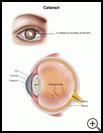
Cataract
________________________________________________________________________
KEY POINTS
- A cataract is a cloudy lens inside the eye behind the iris (the colored part of the eye). This cloudy lens can cause trouble seeing.
- If a cataract is not interfering with your lifestyle or work, your provider may suggest changing your glasses or using brighter light to help you read. If the cataract cannot be helped with glasses or contact lenses, you may need surgery to remove the cataract and replace it with a new plastic lens in your eye.
________________________________________________________________________
What is a cataract?
A cataract is a cloudy area in the lens of the eye. The lens is located inside the eye behind the iris (the colored part of the eye). It helps focus light and images on the retina, the lining of the back of your eye, so that you can see clearly. If the lens gets cloudy, it can cause trouble seeing.
What is the cause?
Most cataracts happen naturally as people get older. What causes cataracts is not known, but many things may make cataracts more likely to form, such as:
- Aging
- Smoking
- Eye injury or previous eye surgery
- Diabetes or other diseases
- Exposure to high doses of radiation to treat cancer of the head or neck
- Long-term use of medicines such as steroid medicines, cholesterol lowering drugs, and antipsychotic medicines
- Inflammation in the front of the eye (iritis)
- Prolonged exposure to sunlight
Cataracts don't spread from one eye to the other, but many people have cataracts in both eyes. The cataract can be worse in one eye compared to the other.
What are the symptoms?
Symptoms may include:
- Blurry vision
- A need for frequent changes in your eyeglasses or contacts
- Glare from lights, especially at night
- Being sensitive to bright light
- Change in color vision
Cataracts do not usually cause complete blindness. However, it is possible to lose enough vision to make it hard to recognize objects.
How is it diagnosed?
Cataracts are often found during a routine eye exam. An eye care provider will evaluate your symptoms and talk with you about the best treatment.
How is it treated?
If a cataract is not interfering with your lifestyle or work, your provider may suggest changing your glasses or using brighter lights to help you read. If the cataract cannot be helped with glasses or contact lenses, you may need surgery to remove the lens. The cloudy lens is usually replaced with a new plastic lens in the eye.
Surgery to remove cataracts can be very successful in restoring vision if the rest of your eye is normal. Although a cataract cannot grow back, you may develop a cloudy film over the thin, clear membrane that holds the new plastic lens in place. This membrane can be taken care of with a laser procedure.
How can I take care of myself?
- Be sure to follow your provider's instructions.
- Call your eye care provider if your vision gets worse.
- Be careful when you drive at night. A cataract can make lights such as oncoming headlights seem very bright, causing a glare that makes it hard to see.
How can I help prevent cataracts?
You may reduce the risk of damaging your eyes and in turn reduce the risk of developing cataracts by wearing goggles or safety glasses at work or during activities where your eyes could be injured. Wearing glasses with a UV coating that protects your eyes from sunlight might prevent or delay some types of cataracts, but this is not proven.
If you have diabetes, good blood glucose control may slow the growth of cataracts.
If you smoke, try to quit or at least reduce the amount that you smoke.
Dietary supplements and vitamins have not been proven to prevent cataracts.
A baby can develop cataracts if a woman has German measles (rubella) or other kinds of infections while pregnant. If you are a woman and plan to have a baby, make sure you have had a German measles (rubella) shot at least 1 month before you try to become pregnant. If you have any infections while you are pregnant, your baby's eyes will be checked by an eye care professional soon after birth.

